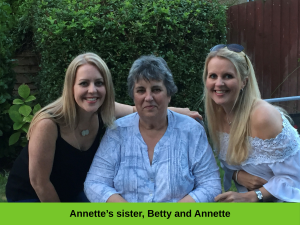
In our second blog post marking Dementia Action Week, Annette tells us how ADSS is supporting her mum, Betty, to live with her dementia diagnosis.
Annette and her sister first started to see changes in Betty after their father died, about 10 years ago. “Initially we put the problems she was having with her memory down to just having lost Dad,” she says. “The GP put her on antidepressants but that didn’t help. Then they suggested to her that she might have dementia.”
Like lots of people, Betty’s initial reaction was of horror. “I was kind of expecting it but mum wasn’t,” says Annette. “Getting dementia had always been one of her biggest fears.” Annette persuaded Betty to go back to the GP for a cognition test – the first step in the diagnosis process – and she was eventually diagnosed over the phone during the Covid-19 pandemic.
It quickly became clear that Betty was starting to need help with day-to-day living. “She could still get her breakfas t and make herself a cup of tea,” says Annette. “But she wasn’t looking after herself like she once had. Me and my sister both work full time and we needed help.” Fortunately, Betty’s GP had referred the family to ADSS, which became Annette’s first port of call.
t and make herself a cup of tea,” says Annette. “But she wasn’t looking after herself like she once had. Me and my sister both work full time and we needed help.” Fortunately, Betty’s GP had referred the family to ADSS, which became Annette’s first port of call.
As well as offering advice and guidance, ADSS was able to provide a carer, who initially came in once a day. Then Betty had a spell in hospital as a result of an existing heart condition. “After that she needed more support,” says Annette. “ADSS didn’t have the resources at the time. We tried social services, and a private provider. But neither of them was a patch on the care we’d had from ADSS.”
Fortunately, ADSS had kept Betty on their books and were soon able to provide what she needed. “We worked with a wonderful lady called Julie Frame,” says Annette. “Mum’s care was upped to three visits a day, including weekends. The carers were just amazing. They took time to get to know mum and always treated her with such kindness. They knew she loved watching Bradley Walsh on TV. They’d sing with her and help her feed the birds.
“They saw her as a person, not a patient. And they always went the extra mile, helping us with GP appointments and medication. We all used the Birdie app so we could see when the carers went in, and they always left us really detailed notes. They provided such reassurance for me and my sister, and such amazing care for my mum. Every six weeks we’d have a review with Julie and I’d just say ‘outstanding’ for everything. I couldn’t fault them.”
Following a fall, Betty has now had to move to a care home in Gravesham where she’s thriving. Even though ADSS is no longer caring for her directly, the connection is still there. They’re still checking in on her even now,” says Annette. “They even clubbed together and got her a Bradley Walsh cushion! It’s clear they really bonded with mum. They’re not just doing it as a job. They really care.”
Without a diagnosis, Betty – and Annette – would not have been able to access any of this support. “Having a diagnosis for mum made life easier in so many ways,” says Annette. “It meant we could talk to the doctor on her behalf, and sort out a lasting power of attorney for health stuff as well as finance.
“And as well as the amazing care from ADSS, they put us in touch with other services such as Ellenor Nurses who’ve helped with mum’s heart condition, the incontinence team and Imago. To anyone putting off getting a diagnosis, I’d say – do it. It’s the key to getting the help you need.”
Find out more about dementia diagnosis here.
At ADSS we are working hard with our partners in the NHS and social care to improve understanding of the importance of dementia and raise awareness of dementia in undeserved communities. Our Dementia Coordinators are working one to one with people to support them through the diagnosis process. Contact us to find out how ADSS could support you.